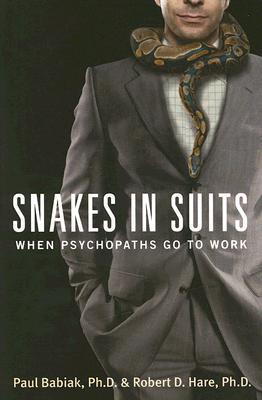What do you think?
Rate this book


Let's say you're about to hire somebody for a position in your company. Your corporation wants someone who's fearless, charismatic, and full of new ideas. Candidate X is charming, smart, and has all the right answers to your questions. Problem solved, right? Maybe not.
We'd like to think that if we met someone who was completely without conscience–someone who was capable of doing anything at all if it served his or her purposes–we would recognize it. In popular culture, the image of the psychopath is of someone like Hannibal Lecter or the BTK Killer. But in reality, many psychopaths just want money, or power, or fame, or simply a nice car. Where do these psychopaths go? Often, it's to the corporate world.
Researchers Paul Babiak and Robert Hare have long studied psychopaths. Hare, the author of Without Conscience, is a world–renowned expert on psychopathy, and Babiak is an industrial–organizational psychologist. Recently the two came together to study how psychopaths operate in corporations, and the results were surprising. They found that it's exactly the modern, open, more flexible corporate world, in which high risks can equal high profits, that attracts psychopaths. They may enter as rising stars and corporate saviors, but all too soon they're abusing the trust of colleagues, manipulating supervisors, and leaving the workplace in shambles.
Snakes in Suits is a compelling, frightening, and scientifically sound look at exactly how psychopaths work in the corporate environment: what kind of companies attract them, how they negotiate the hiring process, and how they function day by day. You'll learn how they apply their "instinctive" manipulation techniques–assessing potential targets, controlling influential victims, and abandoning those no longer useful–to business processes such as hiring, political command and control, and executive succession, all while hiding within the corporate culture. It's a must read for anyone in the business world, because whatever level you're at, you'll learn the subtle warning signs of psychopathic behavior and be able to protect yourself and your company–before it's too late.
352 pages, Paperback
First published May 1, 2006
“Psychopathy is not solely a product of social and environmental forces. Genetic factors play an important role in the formation of the personality traits and temperament considered essential to the disorder. However, its lifelong expression is the result of complex interactions between biological/temperamental predispositions and social forces.
“The difference between psychopathy and antisocial personality disorder is that the former includes personality traits such as lack of empathy, grandiosity, and shallow emotions that are not necessary for a diagnosis of ASPD.”
“Honesty and integrity are a ‘given’ in most organizations, rarely tested on any but the most superficial levels.”
“Psychopaths will lie even to people who already know the truth about what they are saying. Amazingly, more often than not, victims will eventually come to doubt their own knowledge of the truth and change their own views to believe what the psychopath tells them rather than what they know to be true.”